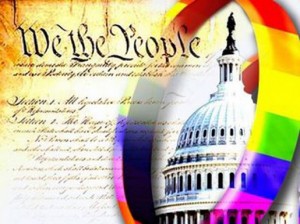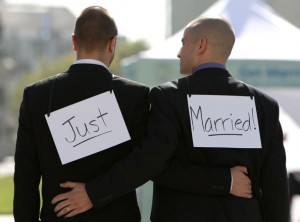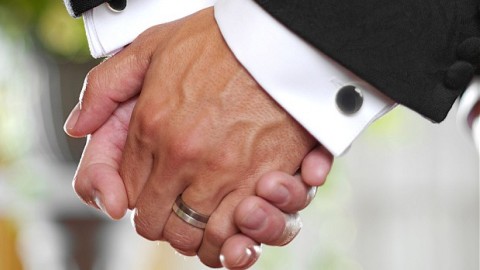My oldest sister’s daughter—the eldest granddaughter—got married the week before Christmas in the lakeside, snowy, storybook province of northwestern Michigan. No rotting institutions and degenerating traditions embody the sorry state of American culture more than weddings and marriage.
 My brother-in-law, who became a made man in a nationwide insurance mafia when he married my sister, laid out big bucks for the wedding. Estimates range from 50 thousand dollars and up.
My brother-in-law, who became a made man in a nationwide insurance mafia when he married my sister, laid out big bucks for the wedding. Estimates range from 50 thousand dollars and up.
This is the same brother-in-law who, only a few years after he started raking in the dough as an insurance agent for a secretive corporate giant, said to me, “There would be a revolution in this country if people knew how much our agents made.” To which I replied ‘you don’t know Americans very well do you?’
Americans will sometimes resent and hate fat cats (especially when taxpayers bail them out on Wall Street only to have them laugh at the suckers all the way back to their own banks); but they’ll just envy and covet the middle class schmuck who makes it to the upper middle class.
In the American wedding tradition, the germination of decades-long grudges is the toxic icing on the cake. Indeed, it’s hard to imagine a cake without it. If you haven’t stomached one, try to sit through an episode of ‘Bridezillas.’
“The Donald’s” (as in Trump) ex-wife, Ivana, helped her daughter throw a splendid ceremony, after Mommy’s day of wedding bliss. I don’t know how many millions were spent, but the mother-daughter fantasy ended in divorce seven months later for Ivana.
This illustrates a general rule of thumb. The importance that a large segment of American women attach to weddings is inversely proportional to the actual meaning and substance of their relationships. And it’s woe to any man—father, brother, or groom—who doesn’t sign on to this march of madness.
On the other side of the connubial coin, 53% of voters in Maine voted to repeal that state’s same-sex marriage law six  months after it was enacted. That’s the same percentage that repealed California’s same-sex marriage law.
months after it was enacted. That’s the same percentage that repealed California’s same-sex marriage law.
The legislatures or courts in five states– Massachusetts in 2003, Connecticut in 2008, Iowa, Vermont, and New Hampshire early in 2009—have given society’s imprimatur to same-sex marriage. But in nearly every state where it has come up for ballot, including California (30 of 31 states between 1998 and 2012), same-sex marriage has been defeated.
The pop tides flow back as easily as they flow forth.
“This is an amazing moment. It’s beyond words,’’ said Mary Conroy, spokeswoman for ‘Stand for Marriage Maine,’ the organization leading the fight against same-sex marriage in Maine. “I feel energized, overcome, overjoyed for the family and the people of Maine.” And I feel sick for the people of America.
Exploiting the irrational fear that if the state sanctioned same-sex marriage, children ‘would begin learning about gay marriage and gay relationships in school’ has aroused much anti-gay sentiment. God forbid that America’s children, many of whom have grown into teenagers like those able and willing to stand around for hours and watch a 15- year-old girl being repeatedly gang raped in the San Francisco Bay Area, should learn about healthy gay relationships.
 It’s time for another strategy, a completely different approach–one that, I daresay, will work.
It’s time for another strategy, a completely different approach–one that, I daresay, will work.
One central motivation that both straight and gay marriages share is a desire for society’s stamp of approval on their unions. For my family and millions like them, it’s all about appearances, largely driven by a need in many women (enabled by sheep-like behavior in most men) to measure up to comparisons by other women. Of course gays mostly want to be treated as equals, legally and socially.
Why should the State be in the marriage business at all? In one stroke, the whole phony debate about whether marriage is between a man and a woman, and (OR in the minds of opponents) between two people of the same sex, evaporates if marriage becomes simply a matter of civil unions for everyone.
Is marriage, by any name or rite, what society deigns to confer, or what two people decide to consummate about their relationship? What society thinks only matters to the extent that society denies or restricts the legal rights of some partnerships, but not others. The law still discriminates, and that’s a large part of the reason gays want state sanctioned marriage.
If all unions were granted the same civil status however, then legal discrimination would end and moral confusion would lessen. Civil union document in hand, couples—straight, gay, or in-between—could then have the church panoply if they so desire.
It appears we’re still a long way from just and sensible attitudes about unions and marriage being embraced across the land. But gays could benefit everyone by dropping their campaign for State approval of same-sex marriage, which is equal parts dress and redress, and pursuing a strategy of equal civil unions for all.
If the Supreme Court rules against gay marriage, or even if it hedges and doesn’t rule in favor of it, there may have no other choice but to pursue such a strategy.
Martin LeFevre
With a few changes to make it current, notably the last paragraph, this column was first published four and half years ago. It holds up well I think, and seems very relevant this week.

